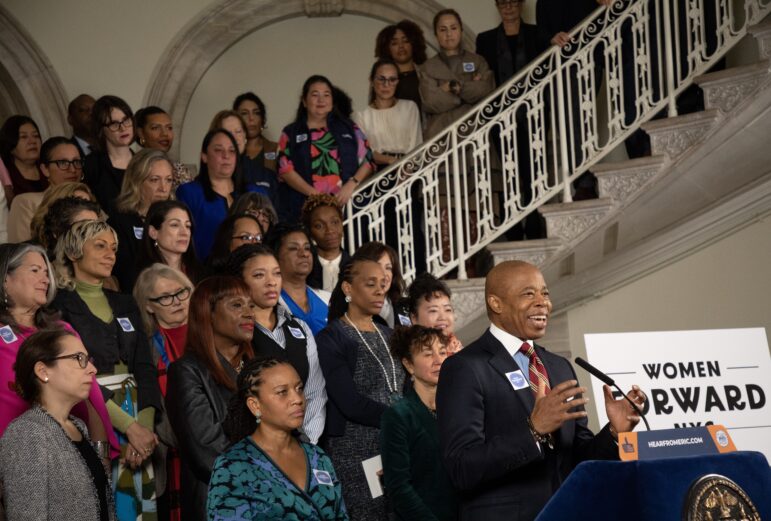
Opinion: ‘Women Forward NYC’ Can’t Succeed While the Mayor Cuts Child Care
There is no equality without affordable child care. Yet despite claiming to stand up for women, since entering office, the mayor has made cut after cut to pre-K and 3-K — programs that have been proven to help women enter the workplace and thrive.
(Violet Mendelsund/Mayoral Photography Office) Mayor Adams details ‘Women Forward NYC’ initiative on Jan. 25 at City Hall.
CityViews are readers’ opinions, not those of City Limits. Add your voice today!
This week, the mayor announced a plan to help women thrive in New York City through a series of new programs and initiatives. Unfortunately, the mayor’s latest investments in gender equity are one step forward after ten steps back. In the past six months alone the mayor has announced over $170 million in cuts to pre-K and 3-K — two critical services that keep women in the workforce, improve gender equity, and help build our city’s economic power.
There is no equality without affordable child care. Yet despite claiming to stand up for women, since entering office, the mayor has made cut after cut to pre-K and 3-K — programs that have been proven to help women enter the workplace and thrive.
Right now, mothers still take on the lion’s share of child care responsibilities, contributing more than seven hours per day to child care, while fathers take on less than five. It is no surprise then that women are four times more likely to miss work because of child care than men. When child care is available, the situation changes completely: maternal employment increases.
I co-founded New Yorkers United for Child Care in November to bring together families who are alarmed by the cuts to our city’s universal pre-K and 3-K systems and understand the value of free child care for all kids under five.
Since launching just months ago, we have collected over 1,000 petition signatures and stories from New Yorkers, predominantly women, who have shared how barriers to child care have impeded them from taking better job offers, advancing in their careers, and realizing their dreams.
A mom from Brooklyn wrote, “I have had to turn down more lucrative work endeavors because I need to be home more.” Another wrote in, “I am currently scaled back from work in order to provide after-school and infant care for my two children. Previously I was full time.”
One statement from women resonated again and again throughout the surveys: “I had to quit my job because we couldn’t afford daycare.”
These testimonies are borne out in the data, which shows that mothers are more likely to have part-time, less well-paying jobs. And by the city’s own estimates, two-thirds of the people who have downshifted careers or left the workforce for caregiving responsibilities since COVID-19 are women.
On the other hand, New York’s once-thriving pre-K and 3-K programs did wonders for women’s participation in the workforce in New York City. The Robin Hood Foundation found that mothers who lived in school districts with greater 3-K availability were more likely to be in the labor force and more likely to be full-time employed than those in districts with lower 3-K availability.
And universal child care programs across the country and the world have helped more women enter the workforce as well. In D.C., maternal employment increased by 10 percentage points after the introduction of universal pre-K for 3- and 4-year-olds. In Quebec, where no family pays more than $10 a day for child care, the rate of women aged 26 to 44 in the workforce is the highest in the world. Quebec’s program is being expanded to the rest of Canada, where they’ve found that it is helping women enter the workforce, so much that they’re seeing the results in payroll tax receipts–the program paid for itself because more women were able to work.
Mayor Adams’ “Women Forward NYC” plan aims to “make New York a better place for women to work, live, and thrive.” But the data is clear: we need universal, accessible pre-K and 3-K to ensure every woman can enter the workforce—and the mayor is taking an ax to these critical programs.
It’s time for City Hall to reverse the cuts, fully fund pre-K and 3-k, and invest in a robust outreach and public advertising operation so that every family in every community can easily access these services. The mayor cannot promise to move women forward, while taking active steps that will hold women back.
Rebecca Bailin is the executive director of New Yorkers United for Child Care.
The post Opinion: ‘Women Forward NYC’ Can’t Succeed While the Mayor Cuts Child Care appeared first on City Limits.


